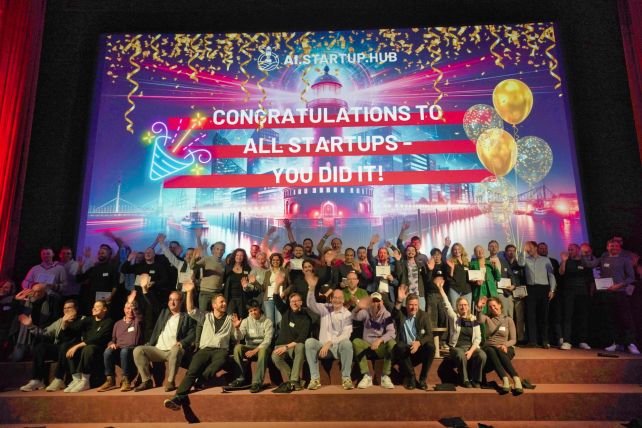How venture clienting works for startups and corporates
Take off with venture clienting
Sales, valuable market validation and improved product development are just some of the benefits that a venture clienting model offers you. Working with an experienced company benefits both sides. We explain the principle and what other benefits you can gain.
When it comes to growth plans and the prospects of success for startups, the term ‘venture clienting’ comes up time and again. This usually refers to the client relationship between startups and established companies. The term was coined by Gregor Gimmy at BMW, where he founded the first Venture Client Unit in 2015. Based on the success, he founded 27pilots in 2018, the first company specialising in venture client-specific consulting and technology. In this interview, he explains what venture clienting is all about and what startups and their clients need to bear in mind.

For which startups are venture clients relevant?
First of all, I would like to define the term ‘venture client’: A venture client is a customer of a ‘venture’, meaning a startup. A venture client is therefore a company that utilises the innovative technologies of startups in order to attain specific business advantages that cannot be achieved with its own resources or established partners. In contrast to other corporate venturing approaches, such as minority investments (corporate venture capital) or accelerators, the company positions itself as a direct customer, focussing on solving complex problems via unique startup solutions. The aim is to use these innovations to solve unsolved problems faster and more effectively, thereby increasing competitiveness through better products and processes.
Based on this definition, the answer is simple: for all of them. Because all startups need customers! Without customers, a startup's product remains unused, it is not developed further, generates no revenue and consequently no profit.
However, startups can only attract venture clients if their products have reached a certain level of maturity that enables customers to solve their specific problem. Startups that are still in the concept phase will hardly be able to convince venture clients. The decisive factor is that the corporate venture client can use the solution, even if only to a limited extent.
When I developed and introduced the venture client model at BMW in 2014, we often bought products at the prototype stage. This allowed BMW to familiarise itself with new technologies early on and test them in real life, while the startup received revenue and valuable customer feedback.
For which companies does venture clienting make sense?
Venture clienting, meaning the use of startup solutions for products and processes, should only be considered if your own internal solutions are significantly worse or not available at all - not even in the network of established partners, such as suppliers. If a startup is only slightly better, it is better to steer clear of it. In addition, the solutions must be for relevant problems, the resolution of which promises a clear competitive advantage that can be measured in sales or profit increases.

This presupposes three things: Firstly, that there are actually startups that offer better solutions - and this is not always the case. Secondly, that you are able to recognise unresolved problems. All companies have problems, but these are often not perceived as such, or their importance is underestimated. Thirdly, and perhaps most importantly, the company must be prepared to be among the first to introduce an innovation from an external, and by definition unstable, startup company. It therefore requires the willingness to be an early adopter. However, this is not absolutely necessary. You can also wait until the startup is no longer a startup or its technology has been taken over by an established company and has become mainstream. Not everyone buys the latest gadget straight away, and not every company immediately invests in the latest robot for production.
But one thing is clear: as there are many strategic problems these days that startups often simply solve better, being a non-venture client is a risk. You run the risk of falling behind the competition or missing the opportunity to gain a decisive competitive advantage.

What advantages or disadvantages can arise for startups through venture clienting?
A startup should know that there are both good and bad venture clients - regardless of whether a company has a venture client unit or not. Companies should be aware that it takes more to solve relevant strategic problems through startups than simply writing the label ‘venture client’ on the door. It is even worse when companies simply rename their accelerator ‘venture client’ - which some actually do.
Bad venture clients can threaten the existence of a startup. They usually don't have a tried and tested venture client model - no venture client-specific processes and resources - which is risky for the startup. The dangers include:
Demand for exclusivity
Demand for the startup's intellectual property rights
Investment rights
Unclear or poorly formulated problems
Pilot projects without payment
Use of the startup as an extended workbench
Lack of experience with venture client methods
No access to strategically relevant problems
Lack of scalability in problem solving
Good venture clients, on the other hand, offer enormous advantages:
Accelerated market maturity and shorter time-to-market: startups benefit from faster market entry because they can test their products in real company environments instead of in isolated labs.
Improved product through expert feedback: Collaboration with experienced specialists in the company helps startups to develop their products faster and in a more targeted manner.
Access to exclusive resources: Startups gain access to technical infrastructures and expertise that would otherwise not be available to them.
Free PR and marketing opportunities: The success of a product in a venture client company provides positive publicity without the startup having to pay for it. In addition, revenue is generated through the business relationship.
Avoidance of investor risks and equity dilution: As venture clients do not require equity investments, the startup's equity remains untouched and potential conflicts with investors or other buyers are avoided.
Higher exit opportunities: Many corporate venture clients strive for more than just a supplier relationship. They often want to become exclusive users of the startup solutions and therefore take over the startup in order to secure the technology completely for themselves.
For a while, there was a trend for large companies to set up their own startup incubators or accelerators. This trend has been on the decline for some time now. Why is that?
The decline in startup incubators and accelerators is mainly due to the fact that many companies have realised that these programmes often do not bring the direct business benefits they had hoped for. In other words, relevant problems that cannot be solved internally or with established partners are not solved by the startups selected for these usually expensive programmes.
The reason for this lies in the operational model of incubators and accelerators. This focuses primarily on developing the startups (through mentoring etc.) instead of identifying the really relevant problems and finding and integrating the best startups with suitable solutions. In short: instead of looking for help from startups, companies help startups.

This model has two major consequences, which ultimately lead to such programmes being discontinued. Firstly, the really good startups - those with strong IP and experienced teams - are not interested in corporate accelerator programmes. They simply don't have the time to invest months in a programme that doesn't generate revenue and offers support they don't need. Secondly, the problems of the companies remain undiscovered, and due to the low quality of the selected startups, they also remain unsolved. There are only costs, but no relevant output. This is why accelerators are ultimately closed.
What do companies need to consider when setting up a venture clienting unit and from what size of company is it worthwhile?
Any company can do high-quality venture clienting - regardless of its size. For example, my company, 27pilots, with less than 100 employees, utilises the technologies of dozens of startups. Often smaller companies or startups are even the first customers of new startups. The difference between small and large companies lies mainly in the resources that are used for venture clienting. The essence of the model itself remains the same. It can be compared to a human resources department, for example. Every company has one, sometimes consisting of several hundred people, sometimes only a few. But here too, they are trained and have the necessary resources and processes at their disposal.
Practical tips for building successful venture client expertise
Define a strategy: A clear startup and venture clienting strategy is the basic prerequisite. This defines why and in which areas startups are relevant. Strategic goals and KPIs are also defined.
Determine executive sponsor: Executive support is crucial to the success of venture clienting.
Introduce a tried and tested venture client model: Not every model works. It requires tried and tested venture client-specific processes, resources (team, software, data) and decision-making criteria that are tailored to the company.
Hire top teams: Either train in-house staff or hire an experienced team to deliver high quality venture clienting.
Set up a venture client unit: A dedicated department is worthwhile from a turnover of approx. 100 million euros. Smaller companies should train 1-2 employees in venture clienting who can take on these tasks on a part-time basis.
Hire experienced consultants: From a turnover of 100 million euros, it makes sense to bring in specialised consultants. This saves time and reduces the risk of making mistakes.
-
Public financing in Hamburg
As a founder in Hamburg, you can access an attractive range of advisory services and an excellently developed funding landscape. Various public funding programmes support your startup financially and with advice, depending on the development phase of your company.
-
Support programmes for startups
In addition to the IFB's public funding programmes, Hamburg offers founders an excellent infrastructure for further financial support. Numerous offers such as startup consulting, accelerator and incubator programmes enable startups to grow and drive innovative ideas forward.









